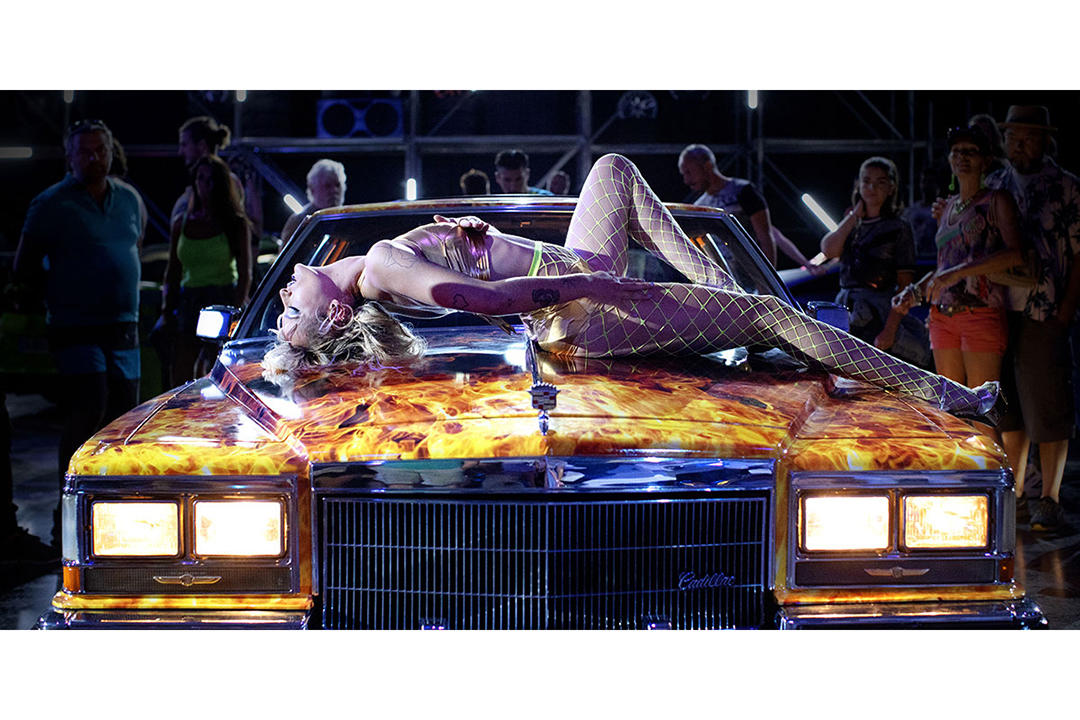Content warning: The plot of Titane contains mentions of murder.
Director Julia Ducournau returns to the Toronto International Film Festival (TIFF) with her highly anticipated film, Titane, and it’s making audiences queasier than ever. Following the wild success of her debut feature Raw, this long-awaited follow-up has garnered critical acclaim early into film festival season.
Titane opens with a seductive close-up of the mechanical interiors of a car. As the scene continues, a young Alexia, the film’s protagonist, is seen creating a fit in the backseat. She mimics the hum of the engine at an unpleasant volume and kicks the back of her father’s chair until he grows impatient. As his anger intensifies, Alexia’s pestering continues, and an altercation between the pair ensues. Their bickering grows worse, and Alexia’s father loses control, crashing the car into a road barrier.
Alexia sustains a serious head injury, which requires a titanium — or ‘titane’ — plate to be surgically placed around the curve of her ear. Viewers get a taste of the grotesque scenes to come with a nauseatingly detailed showing of the piece being drilled to Alexia’s skull. The repercussions of the surgery mimic a parent’s worst nightmare; it leaves Alexia with an odd, sexual attraction to cars.
Fast-forward to present day, Alexia, easily identified by the same horseshoe-shaped scar, is now in her 30s and working as a go-go dancer for a motor show. Her innate attraction to the vehicles she works with makes her a star and in turn, attracts attention — mostly unwanted — from men.
After a long night of work, Alexia refuses an autograph from a male fan. Rather than taking no for an answer, he chases her to her car where he then professes his undying love. Alexia, visibly annoyed, signs his paper only for the man to force her into a kiss. Initially shocked, Alexia quickly turns the kiss sensual. This buys her time to grab her sharp hairpin from the back of her head and swiftly stab the man’s brain through his ear.
Following her first on-screen killing, Alexia cleans off the evidence of the murder in the motor show’s shower. Her frantic scrub is interrupted by a metallic drum sound, luring her out to the showroom. A glistening customized show-car stands erect and continues its rhythmic mating call. Alexia gets in and the car begins to bounce vigorously — the director’s literal take on car sex.
Alexia’s thirst for blood is far from over. During her next human hook-up, she discovers that her most recent one-night stand had resulted in an unexpected pregnancy. Half-car, half-human, the unborn child only complicates Alexia’s status as a serial killer on the run.
Ducournau masterfully sandwiches beats of comedy between the unconventional sex and gruesome violence. At all times, the director has viewers either cringing, laughing, or clawing on the arms of their chairs in anticipation.
However, the emotional turbulence provoked by Ducournau’s films prove to be too much for some. At TIFF’s Midnight Madness screening of Titane, an audience member fainted and was promptly assisted by paramedics. This is a recurring reaction to Ducournau’s work; her 2016 Midnight Madness screening of Raw had the same effect on a few unsuspecting viewers.
Despite the graphic nature of the film, the brutal sex and violence seemed to bode well with those at Cannes Film Festival, receiving a nine minute standing ovation following its world premiere. The film went on to win this year’s Palme d’Or, the most prestigious prize at Cannes. Ducournau made history as the second woman to win this internationally recognized award.
Beyond the initial layers of this intense film, Titane is tender and heartwarming at its core. It is a film with much to offer: a love story, a family reunion, serial killers and their love for cars. So grab a ticket, get some popcorn, and prepare a barf bag — or two. Titane is a truly visceral experience.


